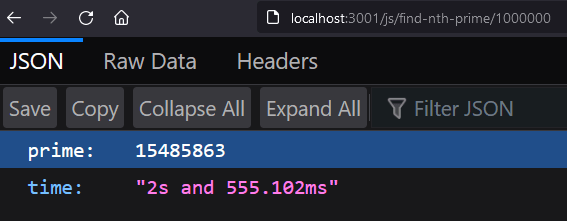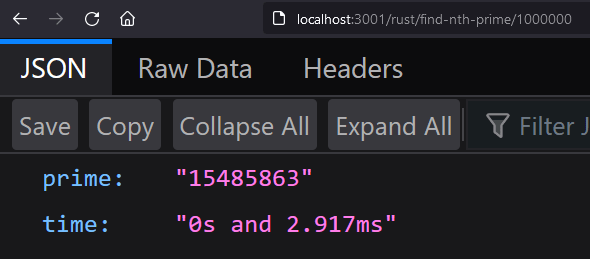How fast is WebAssembly and Rust?
If you're unaware of its existence WebAssembly is an exciting development in the Web development world. WebAssembly is a binary format designed for the Web, this means that you can compile programming languages like C++ and Rust to a format that can be executed in the web browser or by a runtime like NodeJS.
I thought it would be interesting to try this out and compare the speed of executing code in raw JavaScript and then executing similar code in WebAssembly. I decided to go with Rust as my language of choice as the support and tooling for WebAssembly is great.
For the comparison I will be calculating prime numbers, I've chose this as prime number calculation scales badly meaning that the higher the prime number the more time it takes to calculate.
Setting up the server
I used a basic TypeScript, NodeJS, and Express setup to create the routes for the server so I could ping the endpoints and test the code.
import express from 'express';
import http from 'http';
import config from './config';
const port = '3001';
const app = express();
app.use(express.json());
app.use(express.urlencoded({ extended: false }));
// add routers to app
config.routes.forEach((routeName) => {
const route = require(`./routes/${routeName}`);
route.default(app);
});
// ping back URL
app.get('/', (req, res) => {
res.status(200).send({ status: 'OK' });
});
const server = http.createServer(app);
server.listen(port).on('listening', () => {
console.log(`Running on ${port}`);
});
I calculated the nth prime number in JavaScript using this code.
I then used process.hrtime() to track the time it took to calculate the prime number.
const num = Number(req.params.number);
var start = process.hrtime();
const result = findPrime(num);
var elapsedSeconds = process.hrtime(start)[0];
var elapsedNano = process.hrtime(start)[1] / 1000000;
res.send({
prime: result,
time: `${elapsedSeconds}s and ${elapsedNano.toFixed(3)}ms`,
});
I then tested this by calculating the one millionth prime number, it took 2.5 seconds to calculate.

Setting up Rust
The Rust team have made it super easy to create a WebAssembly project and I made use of this great tutorial to get setup.
I started with the wasm-game-of-life template.
To calculate the primes in Rust I used the primal crate.
mod utils;
use primal::{StreamingSieve};
use wasm_bindgen::prelude::*;
// When the `wee_alloc` feature is enabled, use `wee_alloc` as the global
// allocator.
#[cfg(feature = "wee_alloc")]
#[global_allocator]
static ALLOC: wee_alloc::WeeAlloc = wee_alloc::WeeAlloc::INIT;
#[wasm_bindgen]
pub fn find_nth_prime(num: usize) -> usize {
let p = StreamingSieve::nth_prime(num);
p
}
Then to build this, all I have to do is run wasm-pack build --target nodejs and I have a WebAssembly module ready to go.
To make this code available to my Node project I added it to my dependencies in my package.json
"dependencies": {
"express": "^4.18.1",
"node_primes": "file:./rust/pkg"
}
Then I could use the find_nth_prime function as if it were a normal JavaScript module
import { find_nth_prime } from 'node_primes';
...
const num = Number(req.params.number);
var start = process.hrtime();
const result = find_nth_prime(num).toString();
var elapsedSeconds = process.hrtime(start)[0];
var elapsedNano = process.hrtime(start)[1] / 1000000;
res.send({
prime: result,
time: `${elapsedSeconds}s and ${elapsedNano.toFixed(3)}ms`,
});
I again tested this by calculating the one millionth prime number, it took 2ms seconds to calculate, that is ~1,250 times faster!

Conclusion
You won't always see such drastic speed improvements when using WebAssembly over raw JavaScript as this is quite a contrived example. With complex tasks large chunks of memory will need to be copied over into the WebAssembly memory space, these copies are often times slower than simply executing the task in raw JavaScript. That being said it's cool to see the potential of WebAssembly and I hope to see some interesting uses of it in the future.